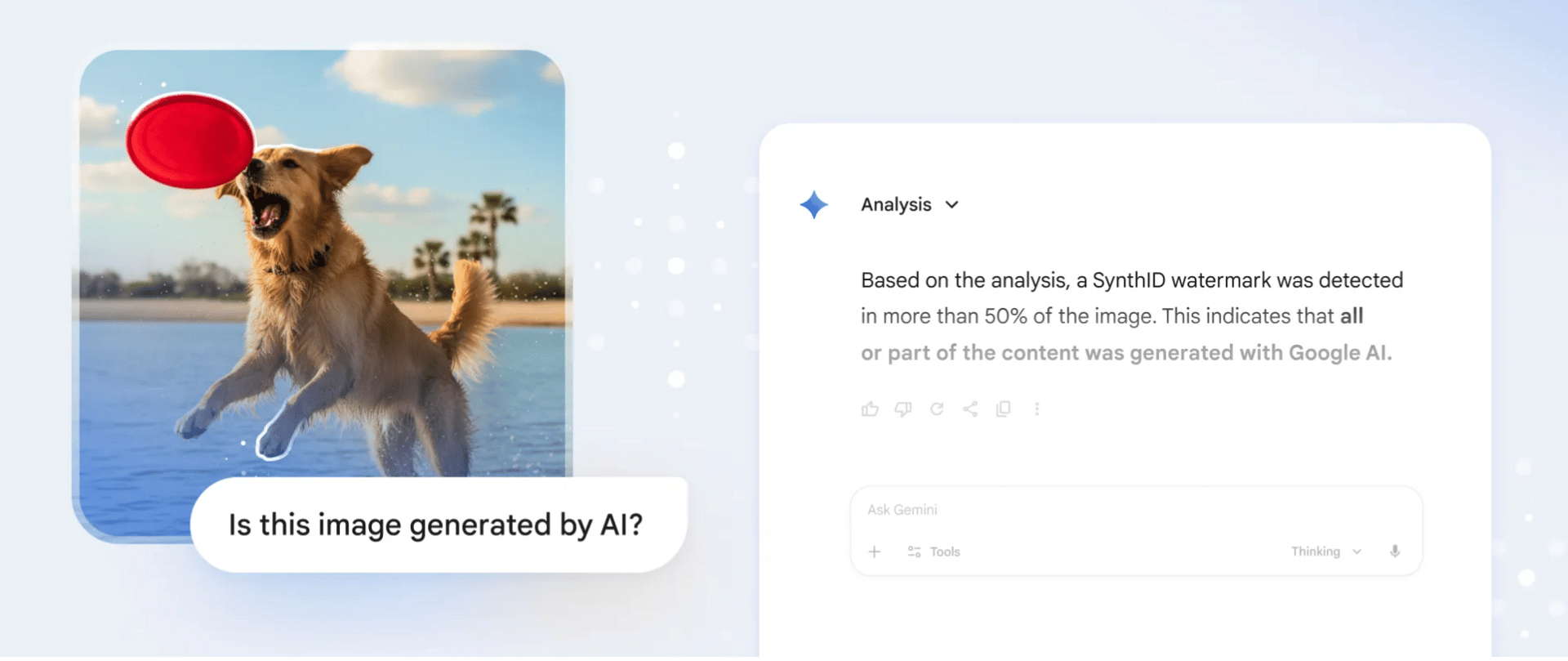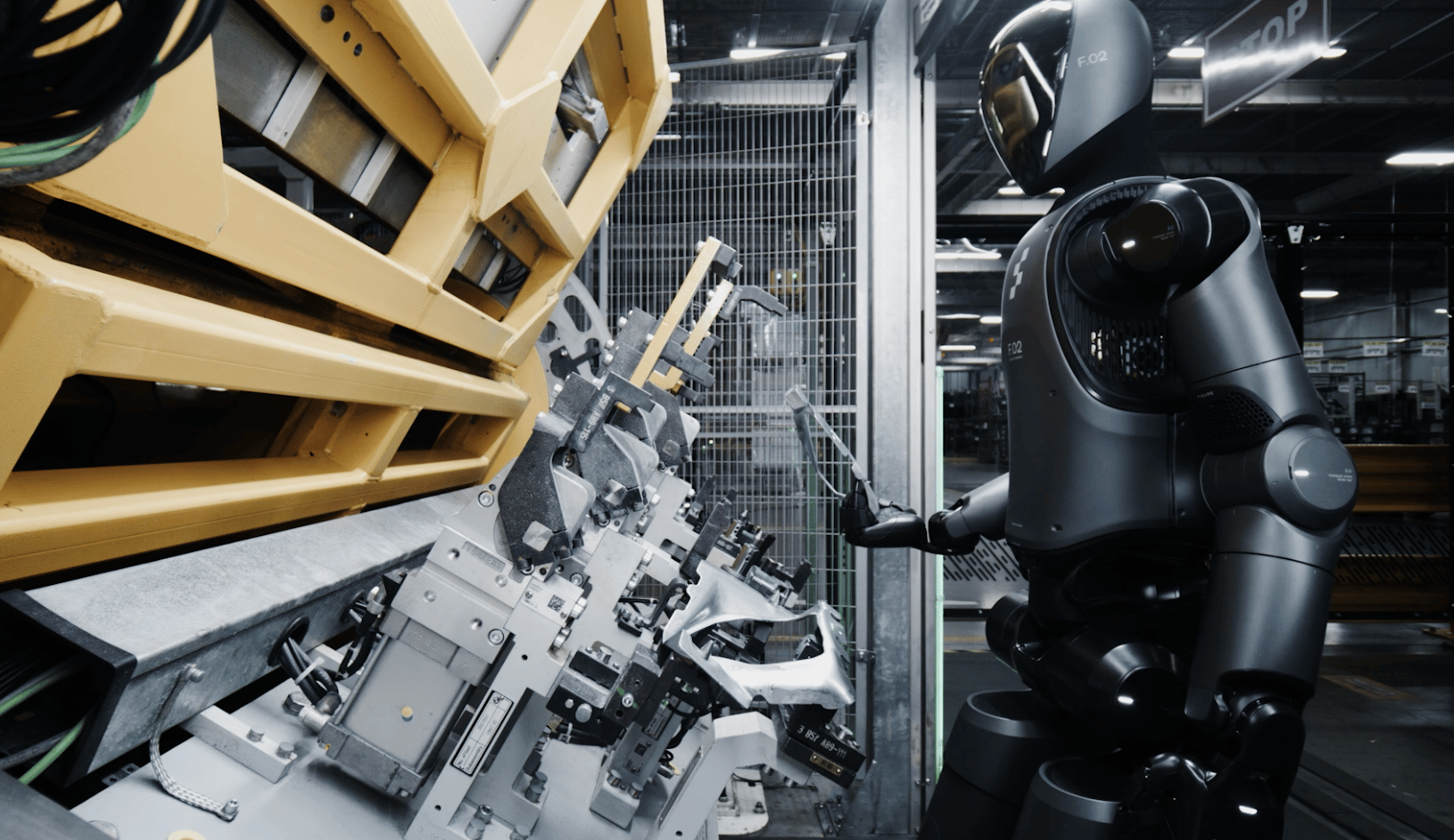- AI Report by Explainx
- Posts
- Gemini’s New AI Image Lie Detector🕵
Gemini’s New AI Image Lie Detector🕵
Gemini verifies AI images via SynthID, Strands enables natural-language SOP agents, and Figure 02 humanoid robot achieves zero-intervention factory deployment.
AI continues to push the boundaries of trust, automation, and real-world execution—transforming how we verify truth, operationalize intelligence, and scale physical labor.
🔍 SynthID + Gemini - In-app AI image verifier detects if visuals were generated or edited using invisible watermarking + Gemini reasoning. Already tagged 20B+ assets, expanding to video, audio, and third-party models.
🧩 Strands Agent SOPs - New AWS open-source framework uses natural language SOPs with RFC keywords (*MUST*, SHOULD) to build reliable AI workflows without complex prompt engineering.
🤖 Figure 02 Robotics - Humanoid robot loaded 90K+ parts over 1,250+ hours to help build 30K BMW X3s with 99% accuracy and zero interventions—paving the way for next-gen Figure 03.
These advancements prove AI is no longer just intelligent, it’s becoming truth-aware, operationally strategic, and physically capable.
SynthID + Gemini: The New Standard for Image Proof

Google is rolling out AI image verification inside the Gemini app, letting anyone upload a picture and simply ask questions like whether it was created or edited with Google AI, while the system checks for SynthID’s invisible watermark and combines that with Gemini’s own reasoning to return origin and context details. This same SynthID stack has already marked over 20 billion AI-generated assets, and the new in‑app verifier is the first step toward a broader transparency layer for media across Google’s ecosystem. Images generated by Nano Banana Pro (Gemini 3 Pro Image) in Gemini, Vertex AI, and Google Ads now ship with C2PA metadata, so compatible tools can expose trusted provenance without manual digging. Over time, Google plans to expand this verification beyond images to video and audio and to read C2PA credentials from third‑party models as well, pushing Gemini toward a more universal “truth check” for synthetic content.

AWS has introduced Strands Agent SOPs, a new open-source approach to building AI agent workflows using natural language instructions in a standardized markdown format. This method balances structure and flexibility by defining clear step-by-step workflows with RFC 2119 keywords like MUST and SHOULD, ensuring reliability while allowing AI agents to reason and adapt dynamically. Teams can easily create, share, and customize SOP templates for various tasks—from code reviews to incident response—without deep prompt engineering knowledge. Strands Agents, built on this framework, enable intelligent AI agents to plan, reason, act, and reflect iteratively, automating complex workflows across tools and multi-agent systems in a scalable, transparent, and modular way, democratizing AI expertise across organizations and now available for the broader AI community to accelerate reliable automation.
Humanoid Robots Load Over 30,000 BMW X3s in Real-World Trial

Figure's humanoid robot, Figure 02, was deployed at BMW's Spartanburg plant for nearly a year, contributing significantly to the assembly line. Over 11 months, it loaded more than 90,000 parts, operated for over 1,250 hours, and helped produce over 30,000 BMW X3 vehicles. The deployment involved a 10-hour daily shift from Monday to Friday, with a focus on sheet-metal loading tasks. The project provided critical insights into hardware reliability, operational challenges, and the importance of precise, adaptive locomotion, which informed the development of the next-generation robot, Figure 03. The robot achieved demanding performance goals such as cycle times under 84 seconds, placement accuracy above 99%, and zero human interventions per shift, marking a significant milestone in integrating humanoid robots into real-world manufacturing environments. These achievements have laid foundational learnings that will guide scaled humanoid robot deployments, improving safety and efficiency on factory floors.
Hand Picked Video
In this video, we'll look at Olly's v1.7 update, where you can now connect Ollama with Olly and use Olly for free.
Top AI Products from this week
Fluently Accent Guru - Markopolo AI creates deeply personalized campaigns that run themselves. Convert 30-40% of warm leads vs. the industry standard of 10-15%.
HushLink- HushLink lets creators sell digital content instantly with simple payment links, no storefronts or monthly fees. It supports secure payouts in 46 countries with a 10% platform fee.
Addsubtitle- Addsubtitle is an AI-powered video tool that auto-translates, dubs, and adds subtitles in 100+ languages with 99.9% accuracy, directly in your browser for faster global content creation.
SimRepo - Stop digging through GitHub. Instantly see similar repos
Container Diet - Stop shipping bloated containers! Container Diet is a CLI tool that analyzes your Docker images and Dockerfiles to provide actionable, context-aware optimization advice. It uses AI to detect unnecessary packages, security risks, and bad practices—all while delivering feedback in a "sassy dietician" persona that makes optimization fun.
Synara - Synara is a developer-first calendar invite and event-sync service that replaces messyics files with fast, reliable API-driven scheduling that's built for modern apps. ICS is 25+ years old and parsed differently across providers. Updates get ignored, duplicated, or partially applied.
This week in AI
AI LLMs Show Subjective Experience Reports - Self-referential prompting makes LLMs report structured first-person awareness, linked to features in deception. This reveals introspection, not true consciousness
Google Ads Enter AI Mode - Google now shows labeled ads in AI Mode responses, integrating shopping and search ads below AI answers. This shift tests ad engagement in AI-driven search.
AgiBot A2 Sets Humanoid Robot Walk Record - China’s AgiBot A2 set a Guinness World Record by walking 106 km nonstop from Suzhou to Shanghai, showcasing battery swap tech, balance, and urban navigation skills
Memo The Home Robot Revolution - Memo by Sunday is a wheeled humanoid robot that uses AI and smart gloves to autonomously clear tables, load dishwashers, fold laundry, and pull espresso shots.
Curiosity Stream’s AI Licensing Boom - Curiosity Stream expects AI licensing deals to surpass subscription revenue by 2027, driven by partnerships leveraging its vast science content to train AI models.
Paper of The Day
The paper "Agentifying Agentic AI" argues that to create truly autonomous AI systems, learning-based models must be combined with structured reasoning, communication, and governance frameworks. It emphasizes incorporating concepts from Autonomous Agents and Multi-Agent Systems (AAMAS), such as belief-desire-intention architectures, communication protocols, and social norms, to enable AI systems that are transparent, cooperative, and accountable. The paper highlights current limitations of agentic AI, including lack of explicit reasoning, coordination, and ethical governance, and suggests leveraging AAMAS tools to build more reliable, aligned, and socially aware AI agents capable of meaningful interaction and accountability in multi-agent environments.
To read the whole paper 👉️ here